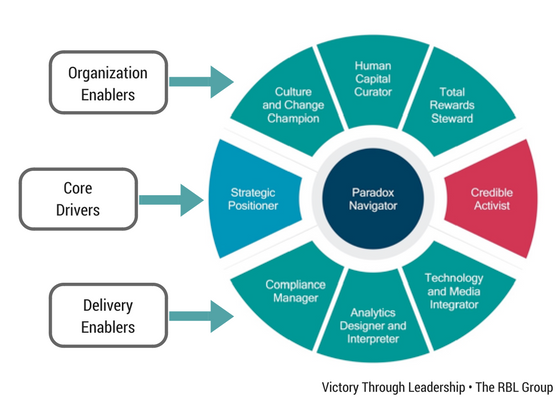
Dave Ulrich, the father of modern HR, is back with his new book Victory Through Organization: Why the War for Talent is Failing Your Company and What You Can Do About It. Dave has authored 30 books and over 200 articles that have helped organisations and the HR profession in particular; his research focuses on how organisations build capabilities of leadership, speed, learning, accountability, and talent through leveraging human resources.
This study, based on a remarkable 32,000 worldwide surveys rating the competencies and performance of more than 4,000 HR professionals from more than 1,200 organisation units, reveals that the organisation has four times the impact on business performance compared to individual talent.
Themes
Building on seven rounds of the HR Competency Study (HRCS) over the last 30 years, the book offers HR professionals tools to better respond to emerging opportunities, and offers guidance for how to build more effective HR departments to deliver real value. There are six critical themes that form a common thread throughout the book: HR matters with 30-40% of executive board time being spent on people or organisational issues; HR research is imperative to deliver a strong foundation of quantitative and qualitative information; HR professionals are changing, of those 20% exceptional in delivering real value for the business, 60% are open to development and making progress towards a better HR service and 20% “are laggards, not able or willing to use HR to drive business results”; HR departments and practices are becoming more important by offering integrated solutions to business problems; HR colleagues are incredibly gifted with successful chief executive officers (CEOs) having the same skills set as successful chief human resource officers (CHROs), in comparison to chief marketing officers (CMOs), chief information officers (CIOs), or even chief financial officers (CFOs); and that HR is a dynamic and innovative discipline with new expertise such as business partnering, workforce planning and analytics becoming foundational parts of HR.
Competencies
Victory Through Organization also establishes a new framework for HR professionals of nine competencies:

Three core drivers of key outcomes: Strategic positioner, those who position the business to win in its market; Credible activist, trusted partners who build relationships through proactivity; and Paradox navigator those able to manage the inherent tensions within an organisation.
Three competencies that are organisation enablers, helping position HR to deliver strategic value: Culture and change champions who navigate the organisational culture to make change happen; Human capital curators who manage the flow of talent by developing people and leaders, driving individual performance, and building technical capabilities; and Total reward stewards who manage employee wellbeing through financial and non-financial rewards.
Finally, delivery enablers that focused on managing the tactical or foundational elements of HR: Technology and media integrator, those adept in the use of technology and social media to drive create high performing organisations; Analytics designer and interpreter, those who use analytics to improve decision making; and Compliance managers who manage the processes related to compliance by following regulatory guidelines.
I am sure Victory Through Organization will follow the trend of his earlier work and live up to expectations to further establish HR as a prominent strategic partner of the business and to embrace HR’s role in creating an organisation that is greater—and performs greater—than the sum of its “employee” parts.

Adam Gibson is a global leader in Workforce Planning, creator of the Agile Workforce Planning methodology and a popular keynote speaker. He has successfully implemented and transformed workforce planning and people analytics in businesses across both the public and private sector. As a consultant, he advises company executives on how to create a sustainable workforce that increases productivity and reduces cost; he is also the head of CIPD’s workforce planning faculty.
